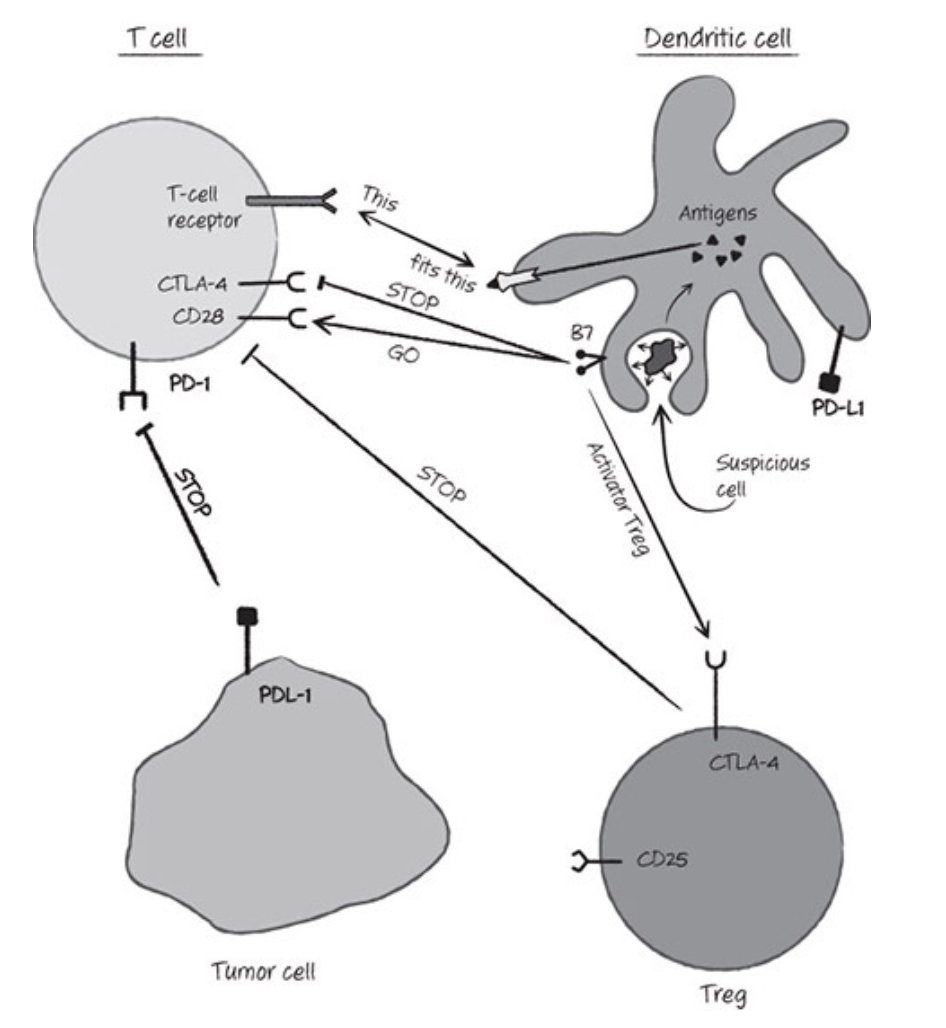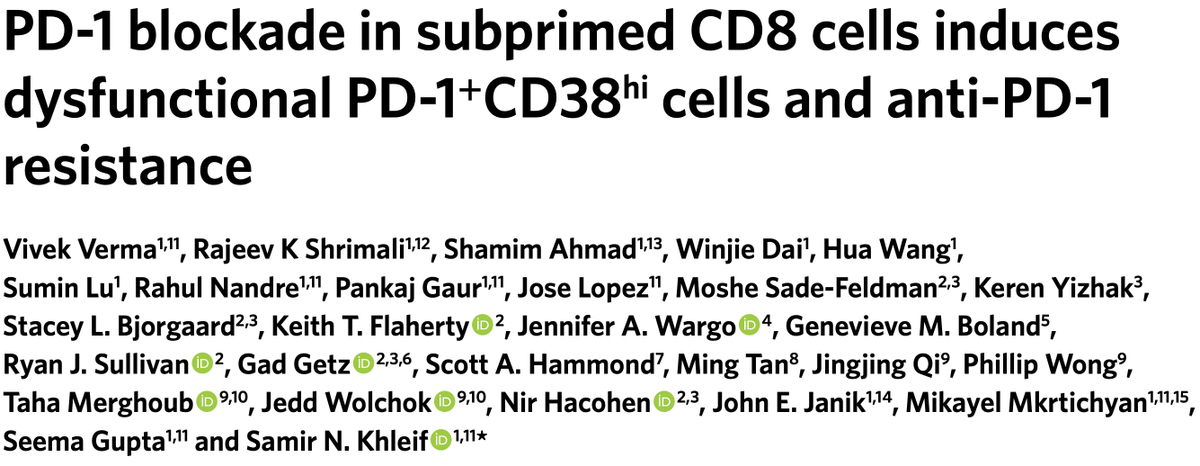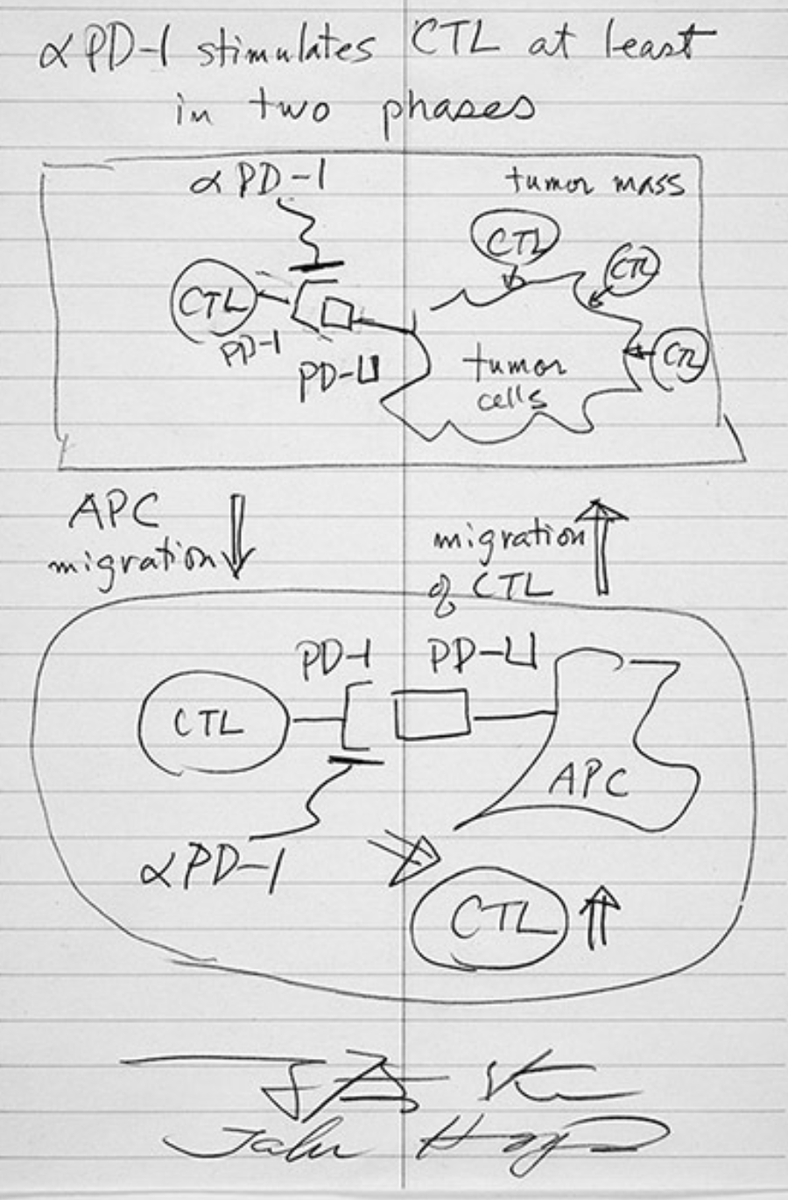1/PD-1 #biology has had a renaissance in recent years
#Immunology
 https://abs.twimg.com/emoji/v2/... draggable="false" alt="🧵" title="Thread" aria-label="Emoji: Thread">
https://abs.twimg.com/emoji/v2/... draggable="false" alt="🧵" title="Thread" aria-label="Emoji: Thread">
Schematic from "A Cure Within" ISBN 1621822176 p.33
#Immunology
Schematic from "A Cure Within" ISBN 1621822176 p.33
2/Let me get back in history for one tweet.
Basically, PD-1 KO mice do not have the dramatic proinflammatory lethal phenotype of CTLA-4 KO
So it was hard to predict that this molecule has any future as a therapeutic intervention, let alone a bigger promise than CTLA-4
Basically, PD-1 KO mice do not have the dramatic proinflammatory lethal phenotype of CTLA-4 KO
So it was hard to predict that this molecule has any future as a therapeutic intervention, let alone a bigger promise than CTLA-4
3/ What& #39;s the mechanism?
It remained complicated for a while (and remains so in my opinion)
For example, the early epiphany by Barber et al. showed that PD-1 blockade restored T cell effector function in chronic LCMV infection https://abs.twimg.com/emoji/v2/... draggable="false" alt="➡️" title="Pfeil nach rechts" aria-label="Emoji: Pfeil nach rechts"> https://rdcu.be/cjx3X ">https://rdcu.be/cjx3X&quo...
https://abs.twimg.com/emoji/v2/... draggable="false" alt="➡️" title="Pfeil nach rechts" aria-label="Emoji: Pfeil nach rechts"> https://rdcu.be/cjx3X ">https://rdcu.be/cjx3X&quo...
It remained complicated for a while (and remains so in my opinion)
For example, the early epiphany by Barber et al. showed that PD-1 blockade restored T cell effector function in chronic LCMV infection
4/ But this seminal study showed reversal of exhaustion at the "population" level so it did not definitively show a restoration of function of the "already exhausted" T cells per se
(I hope this tweet is clear, I feel like I opsonized myself for phagocytic responses)
(I hope this tweet is clear, I feel like I opsonized myself for phagocytic responses)
5/ This point was further elucidated by K. Pauken et al (2012) that Tex were epigenetically stable and that PD-1 blockade only transiently restores effector function only for these cells to succumb to the exhausted fate
 https://abs.twimg.com/emoji/v2/... draggable="false" alt="➡️" title="Pfeil nach rechts" aria-label="Emoji: Pfeil nach rechts"> https://science.sciencemag.org/content/354/6316/1160">https://science.sciencemag.org/content/3...
https://abs.twimg.com/emoji/v2/... draggable="false" alt="➡️" title="Pfeil nach rechts" aria-label="Emoji: Pfeil nach rechts"> https://science.sciencemag.org/content/354/6316/1160">https://science.sciencemag.org/content/3...
6/ To add to our confusion, Wherry and co. that PD-1 deficiency ENHANCES T cell exhaustion
 https://abs.twimg.com/emoji/v2/... draggable="false" alt="➡️" title="Pfeil nach rechts" aria-label="Emoji: Pfeil nach rechts"> https://rupress.org/jem/article/212/7/1125/41837/Genetic-absence-of-PD-1-promotes-accumulation-of">https://rupress.org/jem/artic...
https://abs.twimg.com/emoji/v2/... draggable="false" alt="➡️" title="Pfeil nach rechts" aria-label="Emoji: Pfeil nach rechts"> https://rupress.org/jem/article/212/7/1125/41837/Genetic-absence-of-PD-1-promotes-accumulation-of">https://rupress.org/jem/artic...
7/ So...We know that PD-1 blockade has a clinical therapeutic benefit in T cell responses
Again, what& #39;s the mechanism?
Again, what& #39;s the mechanism?
8/ Several interesting recent answers:
First, H. Chang and M. Davis& #39; groups showed that PD-1 blockade did not reinvigorate exhausted T cells but promoted the expansion of new tumor-specific T cell clones
 https://abs.twimg.com/emoji/v2/... draggable="false" alt="➡️" title="Pfeil nach rechts" aria-label="Emoji: Pfeil nach rechts"> https://www.nature.com/articles/s41591-019-0522-3
https://abs.twimg.com/emoji/v2/... draggable="false" alt="➡️" title="Pfeil nach rechts" aria-label="Emoji: Pfeil nach rechts"> https://www.nature.com/articles/s41591-019-0522-3
This">https://www.nature.com/articles/... was a defining moment in the field
First, H. Chang and M. Davis& #39; groups showed that PD-1 blockade did not reinvigorate exhausted T cells but promoted the expansion of new tumor-specific T cell clones
This">https://www.nature.com/articles/... was a defining moment in the field
9/ Thanks to paired scTCR sequencing and GE
10/ An equally important discovery was made by @SamirNKhleif& #39;s group showing that PD-1 blockade in the absence of optimal T cell stimulation (e.g. vaccine, inflammation...etc) leads to worse outcomes than no blockade
 https://abs.twimg.com/emoji/v2/... draggable="false" alt="➡️" title="Pfeil nach rechts" aria-label="Emoji: Pfeil nach rechts"> https://www.nature.com/articles/s41590-019-0441-y">https://www.nature.com/articles/...
https://abs.twimg.com/emoji/v2/... draggable="false" alt="➡️" title="Pfeil nach rechts" aria-label="Emoji: Pfeil nach rechts"> https://www.nature.com/articles/s41590-019-0441-y">https://www.nature.com/articles/...
11/ This was recently demonstrated by Skokos and co. @Regeneron showing that PD-1 blockade prior to irradiation can abrogate antitumor immunity
 https://abs.twimg.com/emoji/v2/... draggable="false" alt="➡️" title="Pfeil nach rechts" aria-label="Emoji: Pfeil nach rechts"> https://immunology.sciencemag.org/content/6/58/eabg0117">https://immunology.sciencemag.org/content/6...
https://abs.twimg.com/emoji/v2/... draggable="false" alt="➡️" title="Pfeil nach rechts" aria-label="Emoji: Pfeil nach rechts"> https://immunology.sciencemag.org/content/6/58/eabg0117">https://immunology.sciencemag.org/content/6...
12/ All stressing the fact that you need optimal T cell priming and response before you block PD-1
13/ Last but not least, V. Boussiotis and co. showed [surprisingly] that PD-1 deletion on myeloid cells promotes antitumor immunity, upending the paradigm that the impact of PD-1 blockade is primarily T cell-mediated.
 https://abs.twimg.com/emoji/v2/... draggable="false" alt="➡️" title="Pfeil nach rechts" aria-label="Emoji: Pfeil nach rechts"> https://immunology.sciencemag.org/content/5/43/eaay1863">https://immunology.sciencemag.org/content/5...
https://abs.twimg.com/emoji/v2/... draggable="false" alt="➡️" title="Pfeil nach rechts" aria-label="Emoji: Pfeil nach rechts"> https://immunology.sciencemag.org/content/5/43/eaay1863">https://immunology.sciencemag.org/content/5...

 Read on Twitter
Read on Twitter Schematic from "A Cure Within" ISBN 1621822176 p.33" title="1/PD-1 #biology has had a renaissance in recent years #Immunology https://abs.twimg.com/emoji/v2/... draggable="false" alt="🧵" title="Thread" aria-label="Emoji: Thread">Schematic from "A Cure Within" ISBN 1621822176 p.33" class="img-responsive" style="max-width:100%;"/>
Schematic from "A Cure Within" ISBN 1621822176 p.33" title="1/PD-1 #biology has had a renaissance in recent years #Immunology https://abs.twimg.com/emoji/v2/... draggable="false" alt="🧵" title="Thread" aria-label="Emoji: Thread">Schematic from "A Cure Within" ISBN 1621822176 p.33" class="img-responsive" style="max-width:100%;"/>

 https://rdcu.be/cjx3X&quo..." title="3/ What& #39;s the mechanism?It remained complicated for a while (and remains so in my opinion)For example, the early epiphany by Barber et al. showed that PD-1 blockade restored T cell effector function in chronic LCMV infection https://abs.twimg.com/emoji/v2/... draggable="false" alt="➡️" title="Pfeil nach rechts" aria-label="Emoji: Pfeil nach rechts"> https://rdcu.be/cjx3X&quo..." class="img-responsive" style="max-width:100%;"/>
https://rdcu.be/cjx3X&quo..." title="3/ What& #39;s the mechanism?It remained complicated for a while (and remains so in my opinion)For example, the early epiphany by Barber et al. showed that PD-1 blockade restored T cell effector function in chronic LCMV infection https://abs.twimg.com/emoji/v2/... draggable="false" alt="➡️" title="Pfeil nach rechts" aria-label="Emoji: Pfeil nach rechts"> https://rdcu.be/cjx3X&quo..." class="img-responsive" style="max-width:100%;"/>

 https://www.nature.com/articles/..." title="10/ An equally important discovery was made by @SamirNKhleif& #39;s group showing that PD-1 blockade in the absence of optimal T cell stimulation (e.g. vaccine, inflammation...etc) leads to worse outcomes than no blockadehttps://abs.twimg.com/emoji/v2/... draggable="false" alt="➡️" title="Pfeil nach rechts" aria-label="Emoji: Pfeil nach rechts"> https://www.nature.com/articles/..." class="img-responsive" style="max-width:100%;"/>
https://www.nature.com/articles/..." title="10/ An equally important discovery was made by @SamirNKhleif& #39;s group showing that PD-1 blockade in the absence of optimal T cell stimulation (e.g. vaccine, inflammation...etc) leads to worse outcomes than no blockadehttps://abs.twimg.com/emoji/v2/... draggable="false" alt="➡️" title="Pfeil nach rechts" aria-label="Emoji: Pfeil nach rechts"> https://www.nature.com/articles/..." class="img-responsive" style="max-width:100%;"/>



